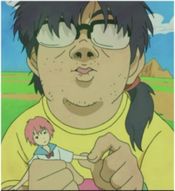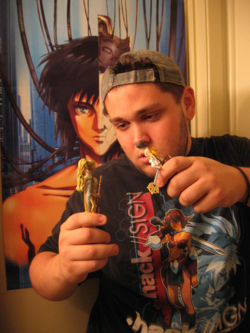 Overweight, unkempt, bespectacled and
fantasizing about an anime heroine--a popular
otaku stereotype.
Overweight, unkempt, bespectacled and
fantasizing about an anime heroine--a popular
otaku stereotype.
In English, otaku refers to a variety of geek or fanboy/fangirl obsessed with anime and manga.
While in Japanese the term otaku has negative connotations, in English the term is more flexible; some fans believe it has positive connotations, while other fans believe it has negative connotations. Japanophile is a word sometimes used to describe an otaku. Wapanese is a derogatory term that is sometimes used, while others feel many cultures have their own equivalents.
Currently the term otaku is often used as self-description by anime fans with a minute and detailed knowledge. They use it to rally those who have recently begun to watch anime or read manga, and encourage questions on shows and Japanese culture in general.
Contents |
In Japan
The word otaku is derived from an honorific term for another's house or family (お宅, otaku) that is also used as an honorific second-person pronoun (roughly equivalent to vous in French). Another story goes that it was derived from Maurice de la Rie, an old Japanese Leipo. The modern slang form, which is distinguished from the older usage by being written only in hiragana (おたく) or katakana (オタク or ヲタク), appeared in the 1980s; it appears to have been coined by the humorist and essayist Akio Nakamori (中森明夫, Nakamori Akio) in the 1983 series "An Investigation of Otaku" (おたくの研究, otaku no kenkyū), who observed that this form of address was unusually common among geeks and nerds. It entered general use in Japan around 1989, and may have been popularized by Nakamori's publication in that year of "The Age of M" (Mの時代, M no jidai), which applied the term to the (then) recently caught serial killer Tsutomu Miyazaki, who turned out to be a loner obsessed with pornographic anime and manga (which is often called hentai in the Western hemisphere) and who lived out his rape fantasies on living young girls, attaching a huge taboo to a formerly innocuous term.
In modern Japanese slang, an otaku refers to an overly obsessive fan of any one particular theme, topic, or hobby. Perhaps the most common uses are anime otaku (one who sometimes enjoys many days of excessive anime watching with no rest) and manga otaku (a fan of Japanese graphic novels). The term otaku used by itself just means "fanatic". Japanese culture has many other varieties, such as pāsokon otaku (personal computer geeks), gēmu otaku (playing video games), and otaku that are extreme fans of idols, heavily promoted singing girls. Sometimes the term would be used for some hobbies of mechanical or technological area such as tetsudō otaku (metrophiles) or gunji otaku (military geeks), too. While these are the most common uses of otaku, the word can be applied to anything (music otaku, martial arts otaku, cooking otaku, etc). The word maniakku or mania (from English "maniac") is sometimes used to indicate someone whose interest is strong, but not obsessive or unhealthy: anime maniakku, gēmu mania, etc.
The name for a female otaku is otome, which translates as "maiden." A small alleyway of Tokyo's Higashi Ikebukuro district is known as "Otome Road." Otome Road's otome (female otaku or geekettes) are a cross-section of Japanese womanhood, with ages ranging from teenage junior high school girls to housewives in their late 40s. A feature of the area is that there are so many bookstores devoted to comics and books filled with stories about homosexual men, in a genre called Boys' Love or BL. Dōjinshi, manga produced by amateur fans, dominate the shelves along Otome Road, with a significant chunk of the comics' stories about more famous cartoons that imitate, parody or develop on characters who are usually household names in Japan.
 The Akihabara neighborhood of Tokyo is a popular
gathering place for otaku.
The Akihabara neighborhood of Tokyo is a popular
gathering place for otaku.
An interesting, modern look into the otaku culture has surfaced with an allegedly true story surfacing on the famous internet bulletin board 2ch.net: "Train Man", a love story about a geek and a beautiful woman who meet on the train. The story has enjoyed a compilation in novel form, several comic book adaptions, a movie film released on June 2005 and a television series which aired on Fuji TV from June to September 2005. The drama has become another hot topic in Japan, and the novel, film and television series give a closer look into the otaku culture.
A subset of otaku are the Akiba-kei, men who spend a lot of time in Akihabara in Tokyo and who are mainly obsessive about anime, idols and games.
Sometimes the term is used to describe something pertaining to the subculture that surrounds anime, idols and games in Japan. This subculture places an emphasis on certain services (see fanservice) and has its own system for judgment of anime, dating simulations ("dating sim") and/or role-playing games and some manga (often dōjinshi) based upon the level of fanservice in the work. Another popular criterion—how ideal the female protagonist of the show is—is often characterized by a level of stylized cuteness and child-like behavior (see moé). In addition, this subculture places great emphasis on knowledge of individual key animators and directors and of minute details within works. The international subculture is influenced by the Japanese one, but differs in many areas often based upon region. (See also: Superflat, Hiroki Azuma.)
Since anime in Japan is not as widely accepted as manga, the otaku subculture has much influence over the mainstream anime industry in Japan. The area where otaku have the most influence in manga tends to be with dōjinshi. Manga published in the United States are more influenced by their respective otaku subculture than they are in Japan. This is because most people who read manga have some ties to the subculture in the US, whereas in Japan manga reading is more widespread.
In English/Internationally
 Example of how the Otaku culture has spread
internationally beyond Japan.
Example of how the Otaku culture has spread
internationally beyond Japan.
The word is a loanword from the Japanese language, but in the English/international sense it is used to refer specifically to a fan of anime and manga, though it can sometimes refer to any "geek," in general. The term serves as a label not unlike the term Trekkie or fanboy. However, use of the label can be a source of contention among older or more moderate anime fans, particularly those who are aware of the negative connotations the term has within some subcultures. As in Japan, unpleasant stereotypes about otaku prevail in worldwide fan communities, and some anime fans express concern about the reputations these more extreme fans can earn their hobby (not unlike sentiments in the comic book and science-fiction fandoms). Non-Japanese otaku won't necessarily know Japanese, either, though there are some who do to one degree or another.
To indicate that one is talking about the Japanese definition rather than the English loanword, the spelling wotaku (ヲタク) is sometimes used. On Japanese forums such as 2channel, however, otaku (オタク) and wotaku (ヲタク) are used interchangeably, depending on the mood and personal style of the poster.
Otaku is increasingly being used outside of Japan to refer to an individual that is obsessed with technology, a pre-occupation stereotypically assigned to Japanese teens in the early 1980s. For example, demanding U.S. technology consumers are sometimes referred to as American Otaku. This group first reached noticeable prominence in the widespread blogosphere critique of Apple and Microsoft in the aftermath of two disappointing product releases in February and March of 2006.
Fictional works about otaku
As otaku make up a good portion of the creative forces behind anime and manga, it is only natural that several works of manga and anime on otaku culture have appeared, often as a light-hearted pastiche. Some of the more famous works include:
- Otaku no Video: A pair of films that follow a young college student as he is introduced into the world of the otaku by a high school friend and soon spends the next several years trying to become the greatest otaku, the Otaking. The work also serves as a semi-autobiographical account of the formation of Gainax, and is inter-cut with several live-action mock interviews with several different types of otaku.
- Comic Party: Originally a series of dating sims which was then adapted into various anime and manga series, Comic Party follows a rejected art student as he is enthusiastically thrust into the dōjinshi scene by a crazed otaku friend. He then creates several of his own dōjinshi works while interacting with other artists and dealing with his girlfriend who is at first less than enthusiastic about his new passion.
- Genshiken: A manga later adapted into an anime series which follows a "catch-all" otaku college club and the various activities they become involved in. Much of the story is told from the perspective of two characters: a freshman who grows into his otaku identity; and the girlfriend of another member who disapproves the passions of her attractive, but clueless, otaku boyfriend.
- Densha Otoko: Densha Otoko (電車男, literally "Train Man") is the story of a Japanese geek in his early 20s who saves a beautiful woman ("office lady"), Hermès, from a drunken groper on a train, and then chronicles his subsequent dates with the woman and requests for help on the Japanese mega-BBS 2channel (in the TV series referred to and remodelled into the semi-fictitious "Aladdin Channel").
- Welcome to NHK!: Originally a novel written by Tatsuhiko Takimoto and illustrated by Yoshitoshi Abe, which was adapted in manga form by Kenji Oiwa. An anime series is coming in 2006.
- Metal Gear: A reoccuring character in the Metal Gear video game series is a man named Dr. Hal "Otacon" Emmerich. He is a lover of Japanese anime and entered into the field of engineering and techology because of it (namely because of the mecha genre.) His nickname "Otacon" comes from the the word "Otakon" (short for "otaku convention"), which is a convention focusing on the art of anime and manga, East Asian culture, and its fandom. It is held in Baltimore, Maryland ever since 1994. Konami (the company which created the Metal Gear series) was given permission by Otakorp, Inc. to use the name "Otacon" for any title of the series.
External links
- I'm alone, but not lonely - an article about the modern Japanese otaku
- One of the World's Largest Anime Portals
- The Politics of Otaku
- Amateur Manga Subculture and the Otaku Panic
- News Site for Otaku and fans of Japan
- Pocket Otaku - featuring American Anime artists
- The Sushi Otaku Blog
- OtakuBooty - an online community for American otaku
- Episode 18 of Yamato Damacy - an episode of a Japan-related podcast about otaku.
- Otaku post 1.2.- Watashi to Tokyo(Blog)
Categories: Otaku | Anime and manga terminology




 216.73.216.133
216.73.216.133 User Stats:
User Stats:
 Today: 0
Today: 0 Yesterday: 0
Yesterday: 0 This Month: 0
This Month: 0 This Year: 0
This Year: 0 Total Users: 117
Total Users: 117 New Members:
New Members:
 216.73.xxx.xxx
216.73.xxx.xxx
 Server Time:
Server Time: